- Home
- Margaret Atwood
Lady Oracle Page 8
Lady Oracle Read online
Page 8
"Why don't you try doing something with her for a change, she's your daughter, too. I'm really at the end of my rope."
My father: silence.
"You don't know what it was like, all alone with her to bring up while you were over there enjoying yourself."
My father: "I didn't enjoy myself."
And once: "It's not as though I wanted to have her. It's not as though I wanted to marry you. I had to make the best of a bad job if you ask me."
My father: "I'm sorry it hasn't worked out for you."
And once, when she was very angry: "You're a doctor, don't tell me you couldn't have done something."
My father: (inaudible).
"Don't give me that crap, you killed a lot of people. Sacred my foot."
At first I was shocked, mainly by my mother's use of the word crap. She tried so hard to be a lady in front of other people, even me. Later I tried to figure out what she'd meant, and when she'd say, "If it wasn't for me you wouldn't be here," I didn't believe her.
I ate to defy her, but I also ate from panic. Sometimes I was afraid I wasn't really there, I was an accident; I'd heard her call me an accident. Did I want to become solid, solid as a stone so she wouldn't be able to get rid of me? What had I done? Had I trapped my father, if he really was my father, had I ruined my mother's life? I didn't dare to ask.
For a while I wanted to be an opera singer. Even though they were fat they could wear extravagant costumes, nobody laughed at them, they were loved and praised. Unfortunately I couldn't sing. But it always appealed to me: to be able to stand up there in front of everyone and shriek as loud as you could, about hatred and love and rage and despair, scream at the top of your lungs and have it come out music. That would be something.
CHAPTER EIGHT
"Sometimes I think you haven't got a brain in your head," my mother used to say. When I was crying, for some invalid reason or other. To her mind, tears were an evidence of stupidity. I'll give you something to cry about. That's nothing to cry about. Don't cry over spilled milk.
"I'm lonely," I told her. "I don't have anyone to play with."
"Play with your dolls," she said, outlining her mouth.
I did play with them, those crotchless frizzy-haired plastic goddesses, with their infantile eyes and their breasts that emerged and receded gently as knees, unalarming, devoid of nipples. I dressed them up for social events they never attended, undressed them again and stared at them, wishing they would come alive. They were chaste, unloved, widowed: in those days there were no male dolls. They danced by themselves or stood against the wall, catatonic.
When I was nine I tried for a dog. I knew I wouldn't get one but I was softening her up for a kitten; I'd been offered one by a girl at school whose cat had six, one with seven toes on each foot. This was the one I wanted. What I really wanted was a baby sister but this was out of the question, and even I knew it. I'd heard her say over the phone that one was more than enough. (Why wasn't she happier? Why could I never make her laugh?)
"Who would feed it?" my mother asked. "Three times a day."
"I would," I said.
"You wouldn't," my mother said, "you don't come home for lunch." Which was true, I took my lunch to school in a lunch box.
With the kitten it was house-training and scratching the furniture. Next I tried a turtle; there didn't seem much that could go wrong with a turtle, but my mother said it would be smelly.
"No it wouldn't," I said, "they've got one at school and it doesn't smell."
"It would get lost behind the furniture," my mother said, "and starve to death."
She wouldn't hear of a guinea pig or a hamster or even a bird. Finally after nearly a year of failures I backed her into a corner. I asked for a fish. It would be noiseless, odorless, germ-free and clean; after all, it lived in water. I wanted it to have a bowl with colored pebbles and a miniature castle.
She couldn't think of any good reason why not, so she gave in and I bought a goldfish at Kresge's. "It will only die," my mother said. "Those cheap goldfish all have diseases." But when I'd had it a week she did give in enough to ask me its name. I was sitting with my eye against the glass, watching it as it swam up to the top and back down again, burping out pieces of its food.
"Susan Hayward," I said. I had just seen With a Song in My Heart, in which Susan Hayward made a comeback from a wheelchair. The odds were stacked against this goldfish and I wanted it to have a courageous name. It died anyway; my mother said it was my fault, I overfed it. Then she flushed it down the toilet before I had a chance to weep over it and bury it properly. I wanted to replace it but my mother said that surely I had learned my lesson. I was always supposed to be learning some lesson or other.
My mother said movies were vulgar, though I suspected she'd once gone to a lot of them; otherwise how would she know about Joan Crawford? So it was my Aunt Lou who took me to see Susan Hayward. "There, you see?" she said to me afterwards. "Red hair can be very glamorous."
Aunt Lou was tall and heavy and built like an Eaton's Catalog corset ad for the mature figure, but she didn't seem to mind. She piled her graying yellowish hair onto the top of her head and stuck extravagant hats with feathers and bows onto the mound with pearl hatpins and wore bulky fur coats and heavy tweeds, which made her look even taller and fatter. In one of my earliest memories of her I'm sitting on her wide, woolly lap - hers was the only lap I remember sitting on, and my mother would say, "Get down, Joan, don't bother your Aunt Louisa" - and stroking the fur of the fox she wore around her neck. This was a real fox, it was brown, it wasn't as mangy as it later became; it had a tail and four paws, black beady eyes and a cool plastic nose, though underneath its nose, instead of a lower jaw, it had a clamp by which it held its tail in place. Aunt Lou would open and shut the clamp and pretend that the fox was talking. It often revealed secrets, such as where Aunt Lou had hidden the gumdrops she had brought me, and it asked important questions also, like what I wanted for Christmas. When I grew older this game was dropped, but Aunt Lou still kept the fox in her closet, although it had gone out of style.
Aunt Lou took me to the movies a lot. She loved them, especially the ones that made you cry; she didn't think a movie was much good unless it made you cry. She rated pictures as two-Kleenex, three-Kleenex or four-Kleenex ones, like the stars in restaurant guides. I wept also, and these binges of approved sniveling were among the happiest moments of my childhood.
First there was the delightful feeling of sneaking out on my mother; for although she claimed to give her consent when I asked permission, I knew she didn't really. Then we would take the streetcar or a bus to the theater. In the lobby we would stock up on pocket-packs of Kleenex, popcorn and candy bars; then we would settle down in the furry, soothing darkness for several hours of guzzling and sniffling, as the inflated heroines floating before us on the screen were put through the wringer.
I suffered along with sweet, patient June Allyson as she lived through the death of Glenn Miller; I ate three boxes of popcorn while Judy Garland tried to cope with an alcoholic husband, and five Mars Bars while Eleanor Parker, playing a crippled opera singer, groped her mournful way through Interrupted Melody. But the one I liked best was The Red Shoes, with Moira Shearer as a ballet dancer torn between her career and her husband. I adored her: not only did she have red hair and an entrancing pair of red satin slippers to match, she also had beautiful costumes, and she suffered more than anyone. I munched faster and faster as she became more and more entangled in her dilemma - I wanted those things too, I wanted to dance and be married to a handsome orchestra conductor, both at once - and when she finally threw herself in front of a train I let out a bellowing snort that made people three rows ahead turn around indignantly. Aunt Lou took me to see it four times.
I saw a number of Adult pictures long before I was an adult, but no one ever questioned my age. I was quite fat by this time and all fat women look the same, they all look forty-two. Also, fat women are not more noticeable than thin women; they
're less noticeable, because people find them distressing and look away. To the ushers and the ticket sellers I must've appeared as a huge featureless blur. If I'd ever robbed a bank no witness would have been able to describe me accurately.
We would come out of the movie red-eyed, our shoulders still heaving, but with a warm feeling of accomplishment. Then we would go for a soda or two or for a snack at Aunt Lou's apartment - grilled crab-meat sandwiches with mayonnaise, cold chicken salad. She kept a number of these things in her refrigerator or in cans on her cupboard shelves. Her apartment building was an older one, with dark wood trim and large rooms. The furniture was dark and large, too, frequently dusty and always cluttered: newspapers on the chesterfield, afghan shawls on the floor, odd shoes or stockings under the chairs, dishes in the sink. To me this disorder meant you could do what you liked. I imitated it in my own bedroom, scattering clothes and books and chocolate-bar wrappers over the surfaces so carefully planned by my mother, the dressing table with the sprigged muslin flounce, bedspread to match, rug in harmony. This was the only form of interior decoration I ever did, and the drawback was that sooner or later it had to be cleaned up.
When we'd had our snack Aunt Lou would pour herself a drink, slip off her shoes, settle into one of her podgy chairs, and ask me questions in her rasping voice. She actually seemed interested in what I had to say, and she didn't laugh when I told her I wanted to be an opera singer.
One of my mother's ways of dismissing Aunt Lou was to say that she was bitter and frustrated because she didn't have a husband, but if this was true Aunt Lou kept it well hidden. To me she seemed a lot less bitter and frustrated than my mother, who, now that she'd achieved and furnished her ultimate house, was concentrating more and more of her energy on forcing me to reduce. She really did try everything. When I refused to take the pills or stick to the diets - neatly drawn up by her, with menus for every day of the week listing the number of calories - she sent me to a psychiatrist.
"I like being fat," I told him, and burst into tears. He sat looking at me with the tips of his fingers together, smiling benevolently but with trace of disgust as I gasped and puffed.
"Don't you want to get married?" he asked when I had subsided. This started me off afresh, but the next time I saw Aunt Lou I asked her, "Didn't you want to get married?"
She gave one of her raucous laughs. She was sitting in her overstuffed easy chair, drinking a martini. "Oh, I was married, dear," she said. "Didn't I ever tell you?"
I'd always assumed Aunt Lou was an old maid because her last name was the same as my father's, Delacourt, pronounced Delacore. "French nobility, no doubt," said Aunt Lou. Her great-grandfather had been a farmer, before he decided to improve himself. He got into the railroad, she said, on the ground floor, sold the farm to do it; that was how the family made its money. "They were all crooks, of course," Aunt Lou said, sipping at her drink, "but nobody called it that."
It turned out Aunt Lou had been married at nineteen, to a man eight years her senior, of good social standing and approved by the family. Unfortunately he was a compulsive gambler. "In one pocket and out the other," she wheezed, "but what did I know? I was madly in love with him, dear, he was tall, dark and handsome." I began to see why she liked the kind of movies she did: they were a lot like her own life. "I tried, dear, I really did, but it was no use. He would be gone for days on end, and it wasn't as though I knew anything about running a house or managing money. I'd never shopped for food in my life; all I knew was you picked up the phone and someone brought it to your house in a box. The first week I was married I ordered a pound of everything: one pound of flour, one pound of salt, one pound of pepper, one pound of sugar. I thought that was what you were supposed to do. The pepper lasted years." Aunt Lou's laugh sounded like an enraged walrus. She liked telling jokes on herself, but sometimes it made her choke. "Then he'd come back and if he'd lost he'd tell me how much he loved me, if he'd won he'd complain about being tied down. It was very sad, really. One day he just never came back. Maybe they shot him for not paying. I wonder if he's still alive; if he is, I suppose I'm still married to him."
I found out even later that Aunt Lou had a boyfriend of sorts. His name was Robert, he was an accountant, he had a wife and children, and he came to her apartment on Sunday evenings for dinner. "Don't tell your mother, dear," Aunt Lou said. "I'm not sure she'd understand."
"Wouldn't you like to marry him?" I asked her when she told me about him.
"Once bitten, twice shy," said Aunt Lou. "Besides, I never got a divorce, what was the point? I just took back my own name, that way I don't have to answer so many questions. Take my advice and don't get married until you're at least twenty-five."
She assumed there would be suitors clamoring at my heels; she didn't even acknowledge the possibility that no one would ask me. My mother's version was that nobody who looked like me could ever accomplish anything, but Aunt Lou was all for dismissing handicaps or treating them as obstacles to be overcome. Crippled opera singers could do it if they would only try. Gross as I was, something might be expected of me after all. I wasn't sure I was up to it.
After her bad experience with the gambler Aunt Lou had gone out and gotten herself a job. "I couldn't type, dear," she said, "I couldn't do anything, the way I was brought up; but it was the Depression, you know. The family didn't have money any more. So I had to, didn't I? I worked my way up."
When I was younger my father and mother were vague about Aunt Lou's job, and so was she. All they would say was that she worked in an office for a company and she was head of a department. I found out what she actually did when I was thirteen.
"I like being fat," I told him, and burst into tears. He sat looking at me with the tips of his fingers together, smiling benevolently but with a trace of disgust as I gasped and puffed.
"Don't you want to get married?" he asked when I had subsided. This started me off afresh, but the next time I saw Aunt Lou I asked her, "Didn't you want to get married?"
She gave one of her raucous laughs. She was sitting in her overstuffed easy chair, drinking a martini. "Oh, I was married, dear," she said. "Didn't I ever tell you?"
I'd always assumed Aunt Lou was an old maid because her last name was the same as my father's, Delacourt, pronounced Delacore. "French nobility, no doubt," said Aunt Lou. Her great-grandfather had been a farmer, before he decided to improve himself. He got into the railroad, she said, on the ground floor, sold the farm to do it; that was how the family made its money. "They were all crooks, of course," Aunt Lou said, sipping at her drink, "but nobody called it that."
It turned out Aunt Lou had been married at nineteen, to a man eight years her senior, of good social standing and approved by the family. Unfortunately he was a compulsive gambler. "In one pocket and out the other," she wheezed, "but what did I know? I was madly in love with him, dear, he was tall, dark and handsome." I began to see why she liked the kind of movies she did: they were a lot like her own life. "I tried, dear, I really did, but it was no use. He would be gone for days on end, and it wasn't as though I knew anything about running a house or managing money. I'd never shopped for food in my life; all I knew was you picked up the phone and someone brought it to your house in a box. The first week I was married I ordered a pound of everything: one pound of flour, one pound of salt, one pound of pepper, one pound of sugar. I thought that was what you were supposed to do. The pepper lasted years." Aunt Lou's laugh sounded like an enraged walrus. She liked telling jokes on herself, but sometimes it made her choke. "Then he'd come back and if he'd lost he'd tell me how much he loved me, if he'd won he'd complain about being tied down. It was very sad, really. One day he just never came back. Maybe they shot him for not paying. I wonder if he's still alive; if he is, I suppose I'm still married to him."
I found out even later that Aunt Lou had a boyfriend of sorts. His name was Robert, he was an accountant, he had a wife and children, and he came to her apartment on Sunday evenings for dinner. "Don't tell your mother, dear," Aun
t Lou said. "I'm not sure she'd understand."
"Wouldn't you like to marry him?" I asked her when she told me about him.
"Once bitten, twice shy," said Aunt Lou. "Besides, I never got a divorce, what was the point? I just took back my own name, that way I don't have to answer so many questions. Take my advice and don't get married until you're at least twenty-five."
She assumed there would be suitors clamoring at my heels; she didn't even acknowledge the possibility that no one would ask me. My mother's version was that nobody who looked like me could ever accomplish anything, but Aunt Lou was all for dismissing handicaps or treating them as obstacles to be overcome. Crippled opera singers could do it if they would only try. Gross as I was, something might be expected of me after all. I wasn't sure I was up to it.
After her bad experience with the gambler Aunt Lou had gone out and gotten herself a job. "I couldn't type, dear," she said, "I couldn't do anything, the way I was brought up; but it was the Depression, you know. The family didn't have money any more. So I had to, didn't I? I worked my way up."
When I was younger my father and mother were vague about Aunt Lou's job, and so was she. All they would say was that she worked in an office for a company and she was head of a department. I found out what she actually did when I was thirteen.
"Here," said my mother, "I suppose it's time you read this," and she put into my hands a pink booklet with a wreath of flowers festooning the front. You're Growing Up, the cover said. On the inside page was a letter, which began, "Growing up can be fun. But there are also some things about it which can be puzzling. One of them is menstruation...." At the bottom of this page was a picture of Aunt Lou, smiling maternally but professionally, taken before her jowls were quite so large. Around her neck was a single strand of pearls. Although she did wear pearls in real life, it was never just one strand. Underneath the letter was her signature: "Sincerely yours, Louisa K. Delacourt." I studied the diagrams in the pink booklet with interest; I read the etiquette hints for tennis games and high-school proms, the wardrobe suggestions, the advice on washing your hair; but I was even more impressed by Aunt Lou's picture and signature - like a movie star, sort of. My Aunt Lou was famous, in a way.

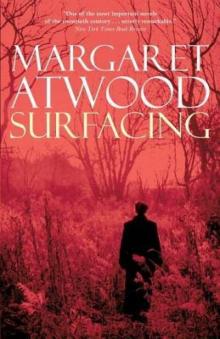 Surfacing
Surfacing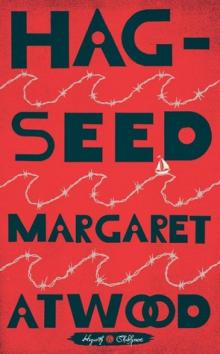 Hag-Seed
Hag-Seed Oryx and Crake
Oryx and Crake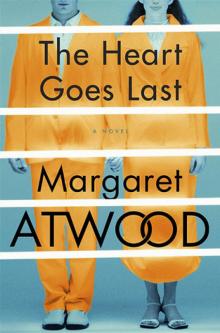 The Heart Goes Last
The Heart Goes Last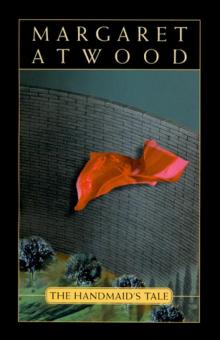 The Handmaid's Tale
The Handmaid's Tale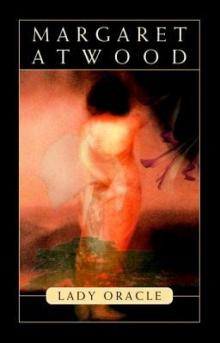 Lady Oracle
Lady Oracle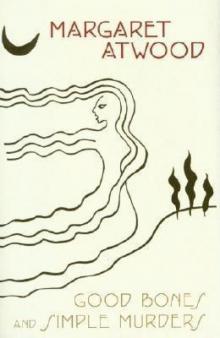 Good Bones and Simple Murders
Good Bones and Simple Murders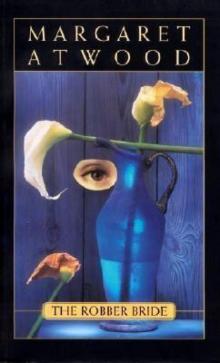 The Robber Bride
The Robber Bride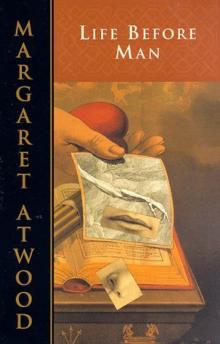 Life Before Man
Life Before Man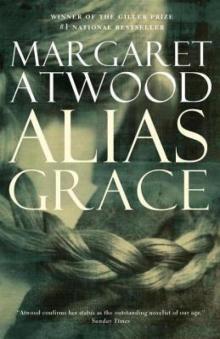 Alias Grace
Alias Grace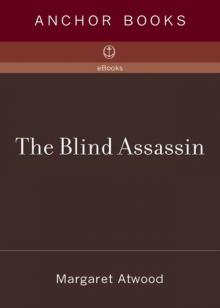 The Blind Assassin
The Blind Assassin Cat's Eye
Cat's Eye The Testaments
The Testaments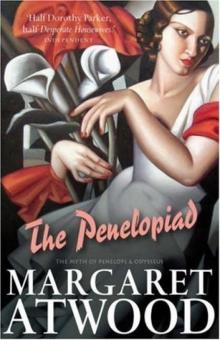 The Penelopiad
The Penelopiad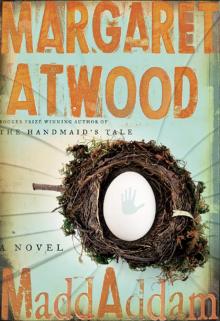 MaddAddam
MaddAddam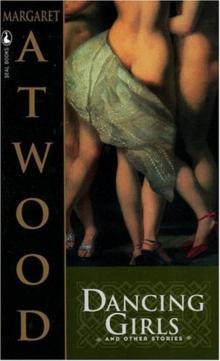 Dancing Girls & Other Stories
Dancing Girls & Other Stories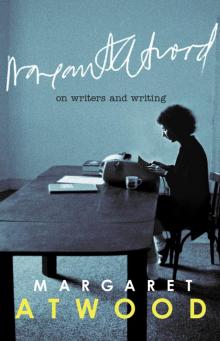 On Writers and Writing
On Writers and Writing Selected Poems II (1976-1986)
Selected Poems II (1976-1986)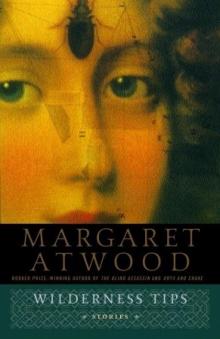 Wilderness Tips
Wilderness Tips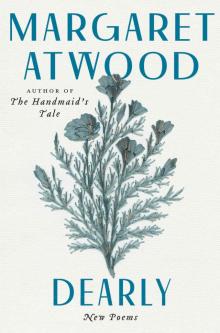 Dearly
Dearly The Tent
The Tent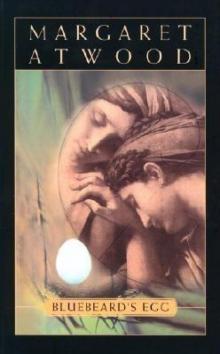 Bluebeard's Egg
Bluebeard's Egg The Edible Woman
The Edible Woman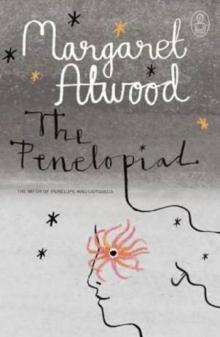 The Penelopiad: The Myth of Penelope and Odysseus
The Penelopiad: The Myth of Penelope and Odysseus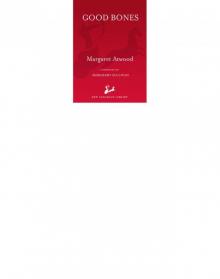 Good Bones
Good Bones I Dream of Zenia with the Bright Red Teeth
I Dream of Zenia with the Bright Red Teeth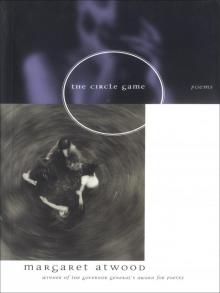 Circle Game
Circle Game Choke Collar: Positron, Episode Two
Choke Collar: Positron, Episode Two Stone Mattress: Nine Tales
Stone Mattress: Nine Tales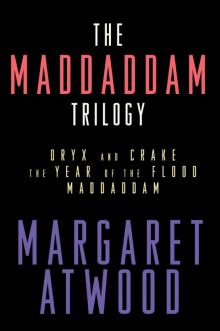 The MaddAddam Trilogy
The MaddAddam Trilogy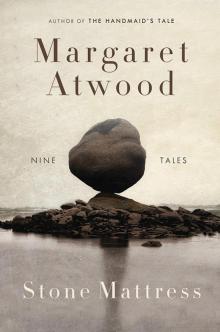 Stone Mattress
Stone Mattress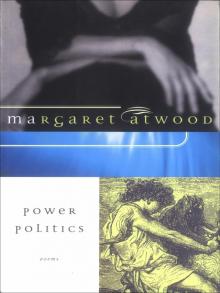 Power Politics
Power Politics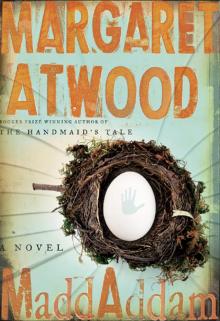 MaddAddam 03 - MaddAddam
MaddAddam 03 - MaddAddam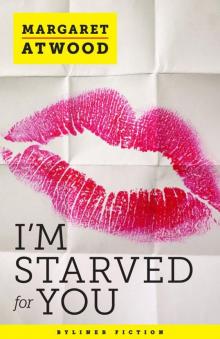 I’m Starved for You (Kindle Single)
I’m Starved for You (Kindle Single) Murder in the Dark
Murder in the Dark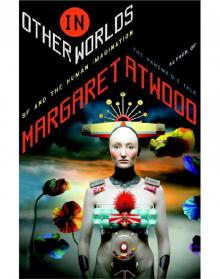 In Other Worlds
In Other Worlds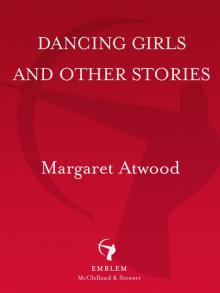 Dancing Girls
Dancing Girls Moral Disorder
Moral Disorder